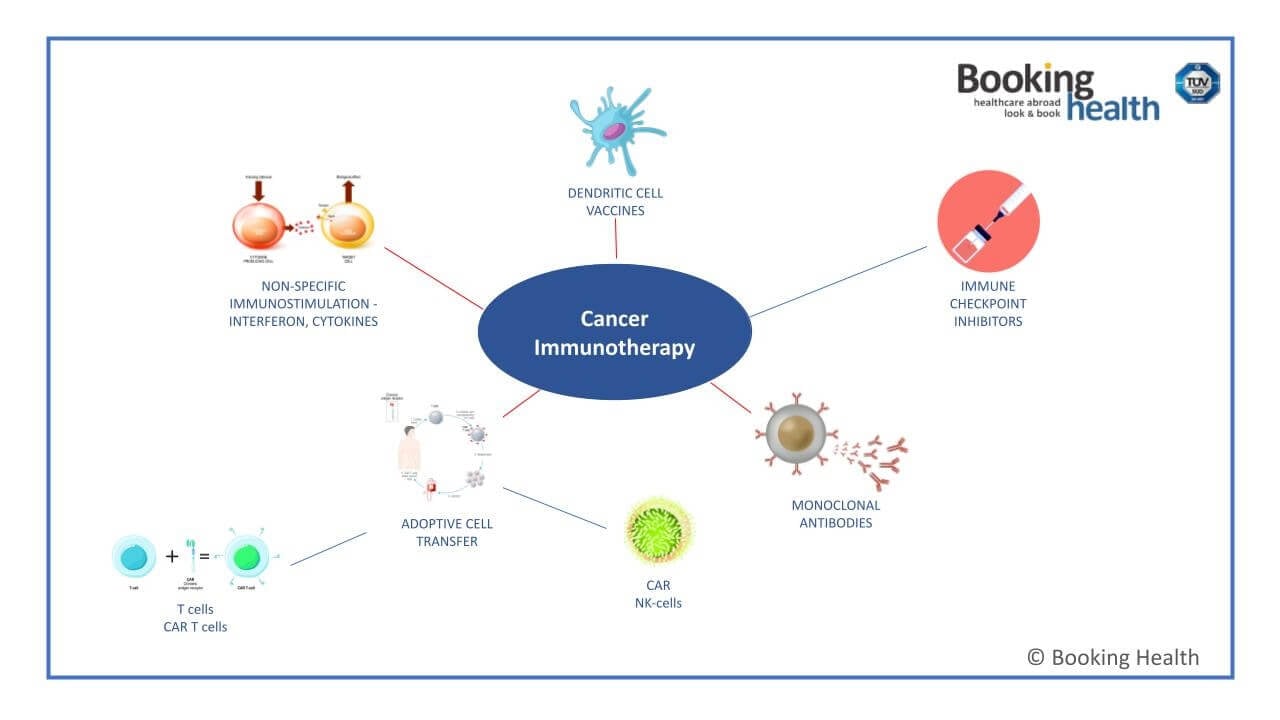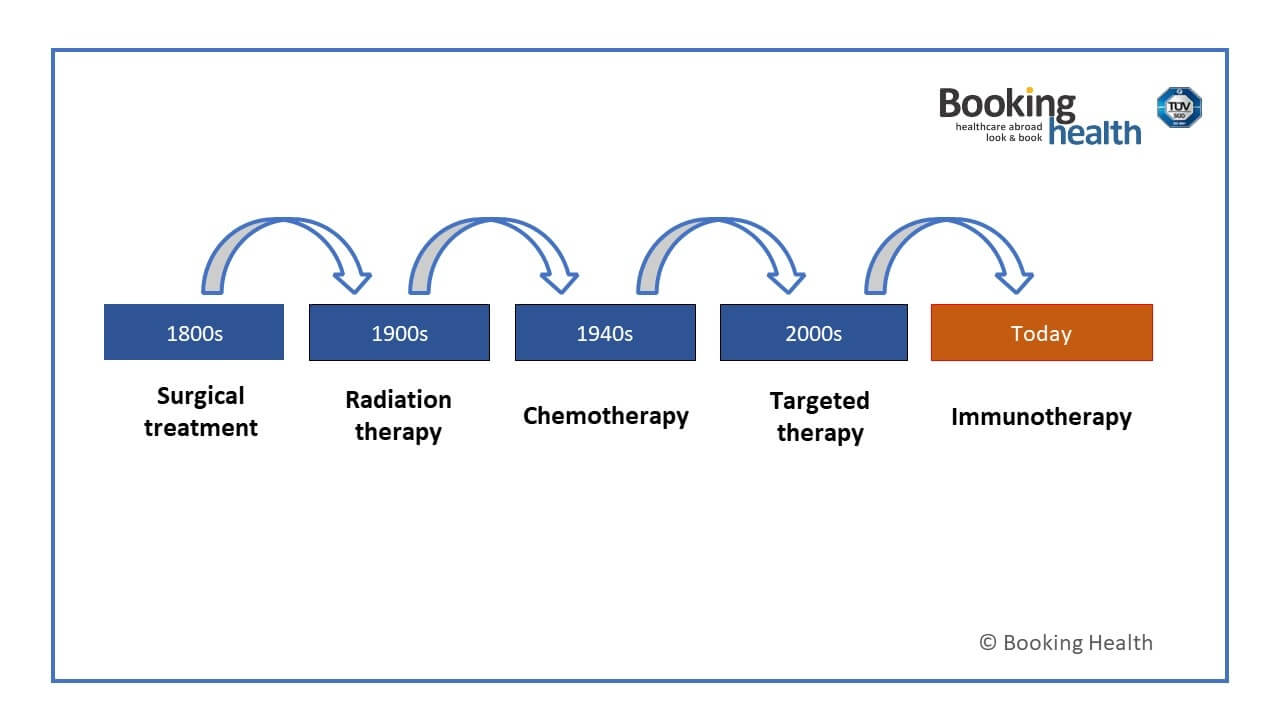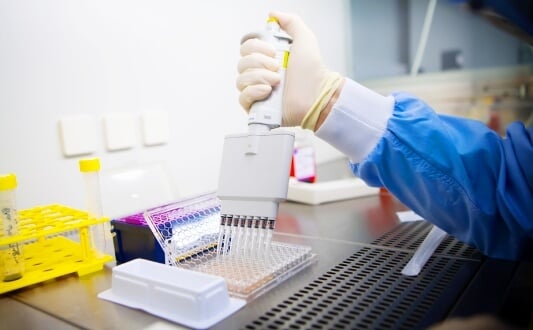Prostate cancer immunotherapy represents a breakthrough in cancer treatment that's showing remarkable results across various disease stages. While traditionally considered for advanced cases, recent clinical evidence demonstrates its effectiveness even in the early stages of prostate cancer, sometimes as an initial treatment option. Immunotherapy also works where other treatments have failed and can no longer stop cancer progression. When restoring a man's antitumor immunity, immunotherapy suppresses the growth of metastases and significantly increases survival rates and life expectancy. Modern treatment protocols include several types of immunotherapy, and German doctors will select the best one for you.
Types of immunotherapy for prostate cancer
Doctors in clinics in Germany use four types of immunotherapy, each of which has its own advantages and characteristics and affects different parts of the immune system:
- Dendritic cell vaccination is the most studied and actively used type of immunotherapy for metastatic prostate cancer. The discovery of dendritic cells revolutionized cancer treatment, opening new possibilities in immunotherapy – an achievement that earned Ralph Steinman the 2011 Nobel Prize in Medicine. The Sipuleucel-T vaccine, which uses these dendritic cells pre-trained to recognize and attack prostate tumors, was the first to receive FDA approval. The LANEX vaccine represents another promising development in this field, showing encouraging results in clinical practice. Treatment cost: €20,000 - €38,000, depending on combination with other treatments.
- Monoclonal antibodies (bispecific T-cell engager (BiTE)). BiTEs are bispecific monoclonal antibodies that simultaneously bind to T-cells and tumor antigens. At the same time, T-cells themselves do not need to have receptors for the tumor. To date, drugs in this group have received FDA approval for treating B-cell acute lymphoblastic leukemia. Their use for prostate cancer is the next step in scientific research. One of the advantages of this type of treatment is that there is no need to synthesize the drug for each patient individually, which significantly reduces the average cost of immunotherapy for prostate cancer. Treatment cost: €375,000 - €420,000; final cost is calculated individually based on program duration and therapy combinations.
- Immune checkpoint inhibitors (CTLA-4, PD-1/PD-L1) affect tumor "masking" and allow anti-cancer immunity to work. These drugs are effective in men with certain genetic changes, such as deficient DNA mismatch repair (dMMR) and high tumor mutation burden (TMB-H). Their advantages include the possibility of being prescribed at any stage of treatment: before or after surgery, after a recurrence is detected, or at the stage of metastasis spread.
- CAR T-cell therapy is based on the genetic modification of the patient's white blood cells. The leukocytes extracted from the blood are genetically modified. A gene responsible for recognizing a prostate tumor is introduced into them. Altered leukocytes are returned to the patient's body, where they begin to destroy malignant cells actively. This technique has high success rates for metastatic cancer but is not very commonly used due to its high cost and lack of access to gene technologies. Treatment cost: €450,000 - €550,000; final cost is calculated individually based on program duration and therapy combinations.
When Is Immunotherapy Recommended for Prostate Cancer?
Modern immunotherapy approaches have emerged as a powerful treatment option for prostate cancer, demonstrating remarkable effectiveness from early stages to advanced cases. They can be integrated into a comprehensive treatment regimen alongside surgery, chemotherapy, radiation therapy, and hormone therapy.
The expanding group of candidates for immunotherapy now includes both patients with early-stage prostate cancer and men with metastatic cancer who have already undergone prostate removal surgery but have not fully recovered. Some innovative immunotherapy methods, particularly newer dendritic cell-based approaches, have demonstrated impressive results when implemented early, potentially reducing the need for more aggressive treatments. If postoperative radiation therapy and chemotherapy have proved ineffective and cancer is insensitive to hormones, doctors proceed to the use of immunotherapy drugs.
Modern immunotherapy approaches aim to prolong life in advanced stages and achieve long-term disease control and potentially complete remission, especially when initiated in earlier stages. Numerous studies and doctors' practical experience show that these techniques cope with these tasks perfectly. Treatment protocols vary by immunotherapy type. While some methods require regular hospital visits, innovative treatments offer more convenient protocols with minimal clinic visits. For instance, dendritic cell vaccines can be administered in just one session, while some targeted therapies can be taken at home.
"Immunotherapy works when a patient has contraindications to surgery and in the ineffectiveness of other treatments, cancer recurrence, and metastatic tumors. That is, in almost all cases."
Recent studies have demonstrated that immunotherapy is effective not only for advanced cancer but also for early stages. When used early, it helps slow disease progression, control symptoms, and significantly extend the relapse-free period. The improved tolerability of newer methods makes some immunotherapy approaches attractive first-line options for many patients. Multiple clinical trials continue to explore new applications and combinations of immunotherapy drugs for various stages of prostate cancer.
How is immunotherapy for prostate cancer carried out?
Therapy with monoclonal antibodies and immune checkpoint inhibitors requires preliminary laboratory testing: doctors are looking for specific mutations that make the tumor sensitive to this type of treatment. Physicians also evaluate kidney and liver function, the size of the primary tumor (if surgery has not yet been performed), and the number of distant metastases. Most drugs are administered intravenously once every 3-4 weeks. A patient can receive additional treatment or stay at home between injections, keeping in touch with the clinic by phone.
CAR T-cell therapy is carried out in several stages. First, a patient visits the clinic for a preliminary examination and blood sampling, during which leukocytes will be isolated, and the remaining components will immediately be returned. The process of genetic modification of leukocytes and the creation of an individual drug will take two to three weeks. A patient will spend this time at home. CAR T-cells are injected intravenously. In most cases, the procedure is conducted in a day hospital. Additionally, a doctor may administer drugs to suppress the immunosuppressive environment of the tumor and symptomatic drugs.
Dendritic cell vaccination follows a two-step program. During the first visit, patients undergo initial clinical assessment and laboratory tests, followed by blood sampling for manufacturing the individual LANEX-DC vaccine. The modern method of liquid biopsy or tumor fragments can be used for vaccine production. The second visit takes place after the vaccine preparation when the patient receives the dendritic cell vaccine along with any indicated symptomatic treatment and specialist consultations. Both steps are conducted on an outpatient basis, each requiring just one day. This innovative therapy has shown successful results after a single injection and can be effectively combined with other treatments such as infusion immunotherapy. A patient's life expectancy after vaccination increases by several months or even years.
To better understand the specifics of this promising approach, we interviewed Professor Frank Gansauge, a renowned expert in immunotherapy with over 22 years of experience in dendritic cell treatment. Prof. Gansauge's clinic has achieved remarkable success in cancer treatment using innovative immunotherapy approaches.
Prof. Frank Gansauge on 22 Years of Cancer Treatment Success: From Nobel Discovery to Modern Immunotherapy
Benefits of immunotherapy for prostate cancer
While initially developed for advanced stages, immunotherapy has now proven effective across different stages of prostate cancer, from early detection to castration-resistant forms of the disease. This field represents a significant breakthrough in cancer treatment, with prostate cancer being the first pathology for which an anti-cancer vaccine received approval.
Advantages of immunotherapy for prostate cancer:
- Works well regardless of the tumor's sensitivity to hormones
- Suppresses not only the primary tumor but also metastases
- Helps control the disease even in situations where the cancer becomes insensitive to chemotherapy
- Has a stronger effect on more aggressive tumors, which are more likely to reach the final stage
- Increases life expectancy
- Improves quality of life
- Can be successfully combined with other treatments
Immunotherapy options used for prostate cancer are well tolerated by patients and rarely cause serious side effects.
| Toxicity | Therapy Duration | Early Stage Effectiveness (5-year survival rate) | Duration of treatment effect | Treatment Cost | |
|---|---|---|---|---|---|
| Chemotherapy | High (65-80%) | Depending on the cancer stage, up to lifelong | up to 75%, with significant side effects | Short-term effect, limited to the course of treatment | €80,000 - €150,000 for the full course |
| Hormone therapy | Low (10-15%) | Given for several months, usually followed by chemotherapy | up to 70% for hormone-sensitive cases only | The effect is present only during treatment | €10,000 - €15,000 |
| Dendritic cell vaccines | Very low (about 1%) | Single injection and lifelong immunity | up to 95% with minimal impact on quality of life | Reliable long-term result, long-lasting remission | €20,000 - €38,000 |
| Targeted therapy | Low (15-20%) | Depending on the cancer stage, treatment may take about a year | up to 75% for matching mutations only | The effect is quite long-lasting in the presence of specific mutations in the tumor | €375,000 - €420,000 for the full course |
*Booking Health data. Success rates vary depending on cancer type, stage, and individual patient factors.
How to undergo immunotherapy for prostate cancer in Germany?
German clinics lead the way in innovative immunotherapy approaches, offering comprehensive treatment programs that combine cutting-edge technologies with decades of clinical experience. Their advanced protocols, particularly in newer treatments like dendritic cell therapy, have shown remarkable success rates in both the early and advanced stages of prostate cancer. This innovative treatment can be combined with other therapies such as chemotherapy or hyperthermia to enhance its effectiveness in fighting cancer cells and alleviating symptoms.
If prostate cancer treatment in your native country does not seem modern and effective enough to you, you can opt for your treatment at German hospitals. A team of doctors will meet at a tumor board to develop an optimal treatment regimen for you personally and recommend the most suitable immunotherapy option. All this is possible thanks to the work of the international medical tourism provider Booking Health.
For more than 12 years, Booking Health has been helping men with prostate cancer from 75 countries to undergo their treatment in leading clinics in Germany: immunotherapy, robotic surgery, cryoablation, external beam or intensity modulated radiation therapy, irreversible electroporation, etc.
The Booking Health specialists accompany you at every stage of your trip:
- selection of a hospital that specializes in prostate cancer immunotherapy;
- selection of your attending physician;
- preliminary preparation of an additional diagnostic or treatment program (for example, if you need to clarify your diagnosis);
- сontrol of the cost of clinic services and elimination of additional fees for foreign patients (saving up to 50%);
- appointment for an outpatient appointment or hospitalization on the preferred date;
- independent control of the medical care program by doctors from the Booking Health company;
- assistance in buying and forwarding medicines for maintenance treatment in your native country;
- communication with the hospital after returning home;
- control of invoices and prices, return of unspent deposit funds;
- organization of rehabilitation activities (if necessary);
- booking apartments, airline tickets, and transfers;
- interpreter and personal medical coordinator services.
For detailed information about the latest immunotherapy options available in German clinics, including innovative treatments that might not be accessible in your home country, you are welcome to contact Booking Health.
Frequently asked questions about prostate cancer immunotherapy
Send request for treatmentImmunotherapy for prostate cancer uses medications to stimulate the patient's immune system to recognize and attack cancer cells. This treatment targets specific proteins or receptors on cancer cells, enhancing the body's natural defenses against the disease.
Benefits include a targeted treatment approach, potentially fewer side effects compared to traditional therapies, and the possibility of long-term remission. It provides new hope for patients with advanced or resistant prostate cancer.
Effectiveness is monitored through regular imaging tests, blood tests, and clinical evaluations. These assessments help doctors determine the therapy's impact and make necessary adjustments.
Side effects can include fatigue, skin reactions, and flu-like symptoms. More severe side effects are rare but can occur, requiring close monitoring and management during treatment.
Yes, immunotherapy can be used in combination with traditional treatments like chemotherapy, radiation therapy, and targeted therapies. Combining treatments can enhance overall effectiveness and improve patient.
Germany offers advanced medical technology and highly experienced oncologists certified by the German Cancer Society. Each case is reviewed by a multidisciplinary tumor board, ensuring a comprehensive treatment approach and the highest quality standards.
Costs vary by treatment: dendritic cell vaccines cost €20,000 - 38,000, treatment with monoclonal antibodies costs €375,000 - €420,000, and CAR T-cell therapy costs €450,000 - 550,000. The final cost depends on the program duration and the combination of therapies.
German research centers currently conduct trials on combined immunotherapy treatments and personalized vaccine approaches. Major institutions like the National Center for Tumor Diseases and the German Cancer Research Center offer eligible patients participation in experimental treatment studies.
Toxicity of dendritic cell vaccines is about 1% – this is the safest option. Hormone therapy shows moderate toxicity of 10-15%, targeted therapy – 15-20% toxicity. Chemotherapy impacts quality of life the most.
Treatment duration varies considerably depending on the approach selected. Dendritic cell vaccines require only a single injection that creates lifelong immunity, representing the most convenient option. Hormone therapy is given for several months before transitioning to other treatments, while targeted therapy may continue for about a year depending on cancer stage. Chemotherapy duration extends up to lifelong administration in some cases.
With vaccines with dendritic cells, prostate cancer patients can achieve up to 95% 5-year survival. Chemo- and targeted therapy can offer up to 75%. Hormone therapy is quite effective, up to 70%, but it works only in hormone-sensitive cases.
Vaccination with dendritic cells provides long-term results – lifelong anticancer immunity is a reality after just a single injection. Hormone therapy and chemotherapy effects are significant only during active treatment. Targeted therapy demonstrates long-lasting effects, but its administration is limited to the presence of specific mutations.
In Germany, a patient pays €20,000-€38,000 for dendritic cell vaccines, €10,000-€15,000 for hormone therapy. Targeted therapy costs €375,000-€420,000 for the full course, and the chemotherapy full course is about €80,000-€150,000.
In Germany prostate cancer patients can access advanced immunotherapy programs. Treatments are individualized and administered in specialized centers. Also they are combined with standard oncology care to enhance immune response.
Choose treatment abroad and you will for sure get the best results!
Authors:
This article was edited by medical experts, board-certified doctors Dr. Nadezhda Ivanisova, and Dr. Bohdan Mykhalniuk. For the treatment of the conditions referred to in the article, you must consult a doctor; the information in the article is not intended for self-medication!
Our editorial policy, which details our commitment to accuracy and transparency, is available here. Click this link to review our policies.
Sources:
Read:
Cancer immunotherapy in Germany
Actinium-225 PSMA Therapy: Revolutionizing Treatment for Metastatic Prostate Cancer
NanoKnife® prostate cancer treatment
Lutetium 177-PSMA: a new generation drug for prostate cancer treatment
Article menu:
- Types of immunotherapy for prostate cancer
- When Is Immunotherapy Recommended for Prostate Cancer?
- How is immunotherapy for prostate cancer carried out?
- Benefits of immunotherapy for prostate cancer
- How to undergo immunotherapy for prostate cancer in Germany?
- Frequently asked questions about prostate cancer immunotherapy
Don't know where to start?
Contact Booking Health








